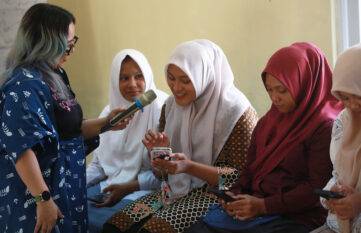The technology landscape in Iraq is fraught with various challenges, especially when it comes to pursuing a career in the sector. These obstacles are even more pronounced for women striving to follow their passion and develop their talents in technology. How do women navigate these circumstances? A conversation with Ravin Rizgar, the director of Suli Innovation House in Sulaymaniyah, Iraq.
You are Suli Innovation House’s founder and director; where did this idea come from?
The idea for Suli Innovation House came from my college experiences. I graduated in manufacturing engineering in 2017, a field dominated by men in Iraq. Despite being a top student, I faced challenges finding a job because I was a woman.
This led me to explore teaching, where I found a passion for a year. Later, I joined an international Non-Governmental Organization (INGO) called Field Ready, working with GIZ’s Information and Communication Technologies (ICT) for a Modern Youth in Iraq project to set up Makerspaces. I began as a technical assistant in Erbil and developed into a Programme Manager for the project in Iraq, enhancing my technical, management, and leadership skills.
At Field Ready, I was also in the lead for setting up a new innovation hub in Sulaymaniyah, the Suli Innovation House, in an old tobacco factory. This experience motivated me to establish my own NGO, Innovation House, which has been running the hub ever since and fulfilled my dream to offer a safe space for entrepreneurs, youth and women to innovate, learn and exchange.
How do you evaluate women in technology in the Kurdistan Region of Iraq (KRI)? And what are the challenges they face?
In assessing the situation of women in technology in KRI, my personal experiences have been a driving force. My goal is that women with technical backgrounds have a supportive environment to work on their projects and ideas. I often witness women struggling to secure their place in this male-dominated field. In my interactions with the private sector, I always advocate for talented women by assuring them of their skills and promoting their employment.
What problems or difficulties are you facing as a young female director?
As a young woman who founded and directs this hub, I often encounter disbelief. People do not believe that I have worked tirelessly to reach this position. While managing the Makerspace in Erbil, I was pursuing my master’s in additive manufacturing engineering, including a stint in Germany. While establishing this space, I had many sleepless nights and long working hours. From the outside, it’s not always apparent how challenging it is to manage and sustain such a space. As a woman, I find myself having to work doubly hard to prove my capabilities in leadership and management, roles that are often assumed to be more suited to men.
Can you tell us how this space operates?
Suli Innovation House has now entered its second year, and in this time, we’ve trained over 600 young individuals. Impressively, more than half of them have either found jobs or launched their businesses. We maintain a strong focus on gender balance, ensuring no less than 47 percent female participation in each training program, and we also offer special training exclusively for women. Our primary focus is on technology, and our training programs are designed to bridge the gap between university education and the demands of the private sector, thereby enhancing the employability of our participants.
While GIZ has funded most of our training in these initial two years, we are actively working on a strategy to sustain the hub independently of external funding. This includes offering various membership packages for different needs, whether it’s using the meeting room, Makerspace or co-working space. Newcomers can explore our space for free for a few days with a special pass, and if one of our graduates has a promising startup idea, we support them with free membership for up to six months.
We have been able to secure funding from the Kurdish Regional Government (KRG), which was an important milestone for us. We are not paying rent for our space as it is government-owned.
What kind of team did you build to manage Suli Innovation House?
At Suli Innovation House, we have a balanced and dedicated team of six. The most remarkable aspect of our team is the sense of unity and support we share. Interestingly, many of our team members were once my students in various training sessions. We prioritise hiring graduates from our training programs, which fosters a deeply connected and supportive team dynamic.
We’ve cultivated an open environment where everyone is encouraged to share their thoughts and opinions without fear of judgment. Any concerns or unhappiness can be freely expressed and discussed within the team. Our approach is very familial; we regularly consult each other on ideas, even those unrelated to work.
The essence of Suli Innovation House goes beyond any individual, including myself. While I may be at the helm today, I recognise that the future might bring different leaders with fresh contributions. We aim to embed this mindset within the organisation, creating a workspace and a community. Suli Innovation House is about a collective effort, not just one person’s vision.

© Suli Innovation House
At 29 years old, Ravin Rizgar, a Manufacturing Engineer, has made significant strides in the tech community as the founder and director of Suli Innovation House. Born and raised in Sulaymaniyah, she advanced her expertise by obtaining a master’s degree in additive manufacturing.
Ravin is deeply committed to cultivating a supportive community for the youth of Sulaymaniyah, Iraq, with a particular focus on empowering female entrepreneurs and innovators. Her previous role as the manager of “Erbil Innovation House” in Erbil, Iraq, further showcases her leadership in the field. Notably, she stands as the only female director of Makerspaces in Iraq, paving the way for women in technology and innovation.






